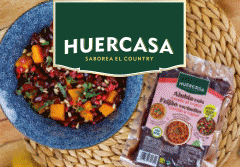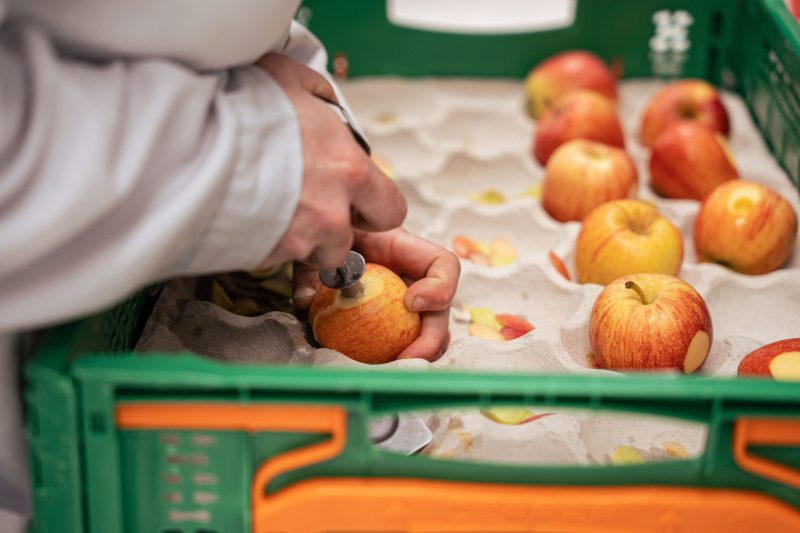Fruit Today talked to Iván Elías, the company’s Sales Manager, who also commented on other details of how the season could turn out.
What are the harvest forecasts, for both the Lerida productions and those from La Finca de La Rasa? What volumes are we talking about?
In the Lerida region, the apple harvest forecast for this campaign is quite promising, with expectations of a normal production, the same as in Soria. There, the plantation is already at its highest production point, approximately 35 million kilos.
What are the production similarities and differences for the two locations?
The weather conditions of the two locations are different; therefore, for some years we have been working on an efficient production management for each variety in the place it adapts to best and in this way, we can offer the best apples, with the best quality, grown in Spain.
In Lerida, early varieties are opted for, such as Gala, Tutti or the yellow Opal and the green Granny Smith, as the conditions in this area are unbeatable. On the other hand, at La Rasa, Soria, thanks to the day and night thermal contrast, two-coloured varieties such as Fuji, Evelina, Sweetango and Envy, in addition to Golden, have been chosen. The opportunity given to us by both areas allows each variety to acquire unbeatable organoleptic characteristics.
What point has the variety reconversion towards trees with less water requirements reached?
Approximately 50% of the first phase. We are talking about Tutti, a variety that has meant a great advance in production efficiency. We are very happy with its results, and this is doubly satisfying owing to the fact that it is the result of over 10 years of research and development by Fruit Futur, an association we belong to with other local producers and international companies.
The drop in fruit and vegetable consumption is concerning; does the Nufri Group have any kind of promotional campaign ready?
We are convinced that the consumption of fruit and vegetables could improve significantly if the products found on the supermarket shelves are of high quality and tasty. Both distributors and farmers must take on the commitment to offer delicious, fresh products all year long to guarantee a constant rotation on the supermarket shelves. This is a group responsibility that requires collaboration and effort by all the agents in the sector.
How is the Livinda apple evolving?
Livinda was created and designed to slow down apple imports and to bring value to the national production. Most of the premium apples on the supermarket shelves were imported. Livinda was born from the conviction that our apples were as delicious to eat as the imported ones, and a decade later, both distribution and consumers have realised that this is true; therefore, now the challenge involves achieving this differentiation at the points of sale, showing that our brand stands out for being Spanish-grown.
Within the varieties that do not belong to any clubs, which are the ones that work best on a commercial scale?
The idea is not to differentiate whether the apples are part of a club or not, but rather to differentiate them by whether they are good to eat or not. The club apples are new clones with organoleptic characteristics that get closer to the tastes of today’s consumers.
Nowadays, in order to obtain apples that are good to eat, it is not enough just to follow traditional growing methods: now they must be protected with netting, not only due to hail, but also to ensure they achieve the right colouring and have fewer defects on their epidermis. This cultivation must be efficient in the use of the resources, and I am not only referring to water. And all of this is achieved using technology.
Operating costs have increased and the farmers have to live, and to live well. For this reason it is essential for the distribution and consumers to understand what is behind a delicious apple in order to discover that in all aspects an apple, whether it is a club apple or not, has a very high production cost.
RELATED NEWS: Nufri and Livinda are giving visibility to mental disorders
What is expected of a variety such as Envy?
This year, an exceptional campaign is expected, both in quantity and in quality, and it will be accompanied by a 360º communication campaign, aimed at growing in penetration and visibility. Because, as we have been able to observe in recent years, Envy is an apple that responds to all the organoleptic characteristics demanded by consumers: crunchiness, sweetness, juiciness… and fortunately, we have more demand than offer. Thus, we will continue planting and opting for this variety.




















